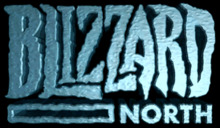 | |
| Formerly | Condor |
|---|---|
| Type | Subsidiary |
| Industry | Video games |
| Founded | 1993 |
| Founders |
|
| Defunct | 2005 |
| Headquarters | , |
| Products | Justice League Task Force, Diablo, Diablo II, Diablo II: Lord of Destruction |
| Website | www |
Blizzard North was the Bay Area division of Blizzard Entertainment, known for its Diablo series. The studio was originally based in Redwood City, California, before moving a short distance away to San Mateo, with Blizzard proper being based in Irvine, southern California.
History
Blizzard North was founded in 1993 under the name Condor by David Brevik, Erich Schaefer and Max Schaefer at the request of Brevik.[1] David Brevik served as the president of the company between 1993 and 2003, while the Schaefer brothers held the Vice President positions in the company. The company was purchased and renamed as Blizzard North by Blizzard Entertainment's former owner Davidson & Associates about nine months before the release of their hit PC game Diablo in 1997.[2][3] However, Blizzard North had complete autonomy from Blizzard Entertainment while David Brevik and the Schaefer brothers continued to manage the company respectively as the President and Vice Presidents.[4] Diablo was highly successful, and its 2000 sequel Diablo II even more so. An expansion pack, Diablo II: Lord of Destruction, followed the year after.
By June 2003 two new games were in production. The first game in production was Blizzard North's version of Diablo III which later was scrapped and restarted by Blizzard Entertainment. The second game was Diablo-like game which would take place in space. On June 30, however, several key employees left Blizzard North to form two new companies. Eight moved to form Flagship Studios, including Blizzard North founder and president David Brevik, the Schaefer brothers and Bill Roper who was transferred from Blizzard Entertainment to Blizzard North in late 1996. Another nine employees left to form Castaway Entertainment. By the time the exodus concluded, around 30 employees had left the company.
The resignations were partly due to a conflict with Blizzard Entertainment's owner, Vivendi, and partly due to employees wishing to start something new. Back at Blizzard North, however, the resignations had a common effect; of the two unannounced games that were in production, one was canceled. Blizzard Entertainment has since said the canceled game was a "Blizzard North kind of game".
On August 1, 2005, Blizzard Entertainment announced the closure of Blizzard North. A key reason for the closure was Blizzard North's poor development of what was to be Diablo III, which did not meet Vivendi's expectations. Former Blizzard North staffers including Joseph Lawrence, Wyatt Cheng, and Matt Uelmen subsequently appeared in the credits of Blizzard's next retail release, World of Warcraft: The Burning Crusade. The work of former Blizzard North artist Phroilan Gardner was featured in editions of World of Warcraft: The Trading Card Game around the same time.
A few employees from the Diablo team, including Eric Sexton, Michio Okamura, and Steven Woo, organized to launch a new company, Hyboreal Games.[5]
Games
As Condor
- NFL Quarterback Club '95 (1994) - handheld versions
- Justice League Task Force (1995) - Mega Drive/Genesis version
- NFL Quarterback Club '96
As Blizzard North
- Diablo (1997) - action role-playing game
- Diablo II (2000) - action role-playing game
- Diablo II: Lord of Destruction (2001) - expansion pack
Cancelled
- NFLPA Superstars (for the canceled Panasonic M2 console)[6]
- Diablo III (in development 2000-2005)
See also
- Runic Games
References
- ^ "Indie Insider Podcast with David Brevik".
- ^ "Davidson & Associates, Inc. Signs a Definitive Merger Agreement With Condor, Inc". PR Newswire. 1996-03-06. Retrieved 2009-09-28.
- ^ "Merger Madness Continues". GamePro. No. 94. IDG. July 1996. p. 16.
Condor's name will change to Blizzard North as it finishes up Diablo, an eagerly awaited RPG due next month.
- ^ "Escapist Magazine - The Rise of Blizzard".
- ^ Hyboreal Games Q&A - Shacknews - PC Games, PlayStation, Xbox 360 and Wii video game news, previews and downloads Archived October 17, 2006, at the Wayback Machine
- ^ Brevik, David (11 May 2016). "Diablo: A Classic Game Postmortem". Game Developers Conference (conference talk). 30 minutes in. Retrieved 6 January 2019 – via YouTube.
- Paul Loughrey (November 29, 2005). "Blizzard North veterans form new independent development studio". gamesindustry.biz. Retrieved 2007-05-05.
- Simon Carless (November 28, 2005). "Ex-Blizzard Veterans Form Hyboreal Games". gamecareerguide.net. Retrieved 2007-05-06.
- Ryan Ball (November 28, 2005). "Blizzard Vets Form Hyboreal Games". Animation Magazine. Retrieved 2007-05-06.
- "Gamespot Company Page For Blizzard North - Games By Blizzard North". gamespot.com. Archived from the original on 2007-09-30.